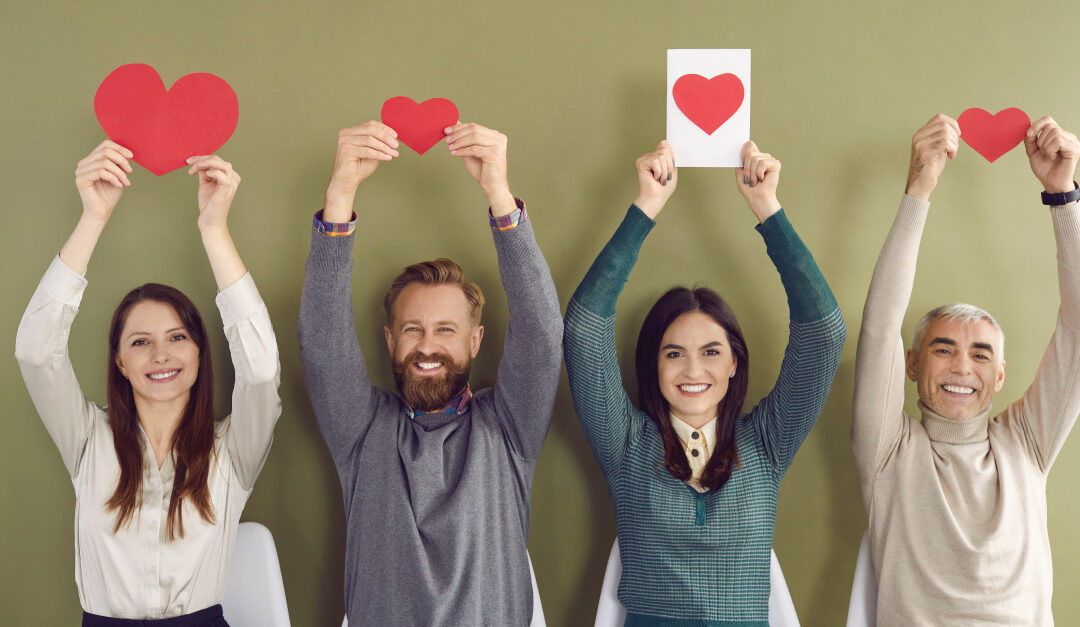In the face of the most severe mental health epidemic in the history of Corporate America, charitable team building may seem like an unlikely therapy. But it works!
Agony by the numbers
From the pandemic to climate change to economic volatility to domestic and international terrorism—our mental health is constantly under attack. So burnout, anxiety, stress, and depression are now chronic problems in the American workplace.
A recent report from FORBES.COM reveals this: “According to the National Institute of Mental Health, one in five Americans (57.8 million in 2021) were living with some type of mental illness, ranging from mild to moderate to severe anxiety and depression. That number has increased as a result of the pandemic and the ensuing turbulence in the workplace along with a dwindling economy. Anxiety is the highest reported mental health disorder in the U.S. with 42.5 million Americans suffering from this illness.”
And according to MENTALHEALTHFIRSTAID.ORG, “While employees are more productive now than ever before, many also have intense feelings of loneliness, depression, seasonal depression, anxiety and substance use challenges……Studies show that every year, up to 200 million workdays are lost to mental health challenges. Untreated mental illness costs the United States a staggering $3.7 trillion every year. And approximately 10.8 million full-time employees face a substance use challenge.”
Equally alarming and heartbreaking is the impact of mental illness on young workers. “Gen Zers and millennials report the most stress and anxiousness among all generations. The younger the workers, the more stress and anxiousness they report. About 60% of Gen Zers report feeling stressed or anxious frequently or all the time, compared to approximately 50% of millennials and just 30% of baby boomers,” according to BUSINESS.CALM.COM.
Ironically, while the stigma around mental illness persists and many older people are reluctant to seek the help they need, Gen Zers and Millennials are making a profound difference by challenging that stigma.
In an interview with BUSINESSINSIDER.COM, Emily Tsitrian, the CEO and cofounder of Yeeld, reported that “Both millennials and Gen Z have done ‘a lot more’ to destigmatize mental-health challenges and normalize counseling and therapy. Those are lessons that everyone can learn from….”
The therapeutic benefits of charitable team building
Mental illness is now the sickly pink elephant that neither the C-Suite nor any other level of management can ignore. And fortunately, some corporate leaders are not only confronting it but combating it.
From gym memberships, yoga classes, and meditation breaks to mental health support programs and stipends for psychological and emotional care. Many CEOs are creating a corporate culture of wellbeing and staffers are beginning to embrace these new benefits and therapeutic offerings.
Such a compassionate business model is groundbreaking—and a bit unsettling to most “traditional” leaders. But the truth is that an even more rigorous and strategic focus on mental health at work is needed especially among corporate executives and middle managers!
Many leaders are just beginning to recognize how serious this crisis is, and are wrestling with their own convictions about the problem. As it happens, the most important thing they can do right now is to adapt their leadership style to a more empathetic one.
The Center for Creative Leadership defines empathetic leadership as “…having the ability to understand the needs of others, and being aware of their feelings and thoughts. Unfortunately, it has long been a soft skill that’s overlooked as a performance indicator.”
But, even if you’re open to it, this can seem like a very daunting challenge. Where do you begin? And how do you know if you’re getting it right?
Where to begin: Magnovo. With our charitable team building strategies you’ll “get it right every time.” Why? Because each Magnovo event is literally empathetic leadership in action!
Charitable team building and wellbeing
With Magnovo’s facilitators, your team may build wheelchairs for disabled veterans, or bicycles for area youth.
You might collect and donate:
school supplies for local students;
toiletries, books, and snacks for hospital patients; or
sports gear for aspiring young athletes from low-income families.
How about shipping “care packages” to homesick overseas military personnel? Or providing starter kits to cash-strapped pet lovers to ease the financial strain of pet adoption?
Throughout each event your staff will divide into small groups and engage in ‘friendly’ but competitive activities to assemble or collect donations the fastest. And in the process they’ll learn how to communicate and collaborate with greater efficiency.
Kindness cures broken minds and mends broken hearts
Here’s the thing: It’s not so much what you assemble or what you donate that matters. It’s why you do it. It’s literally impossible to spend a day investing your time, talents, and energy for the benefit of a complete stranger without benefiting yourself.
When you give, your brain releases endorphins which promote a sense of peace and tranquility. It stabilizes blood pressure and reduces stress which can improve your overall health. And when your giving is a team effort, it transforms the whole emotional context of your relationships with colleagues. That’s empathy in action!
Your why can heal. Your why can change lives. Your why is Magnovo’s mission.

